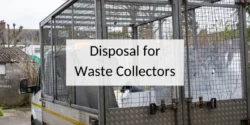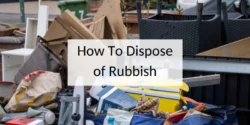Guide to Persistent Organic Pollutants (POPs) Furniture Disposal
Complete Guide to POPs legislation and Upholstered Furniture Disposal
Are you looking to understand more about POPs legislation and how it affects disposal of upholstered furniture? This guide provides a plain English explanation of what it all means. It includes a definition of POPs, what sort of furniture has them, and the rules that govern disposal of how they are disposed. Plus, some practical tips and advice on how you can undertake the disposal of POPs furniture yourself.
What are POPs?
POPs stands for Persistent Organic Pollutants. POPs are very toxic chemicals that don’t break down easily and remain in the environment for a long time. As a result, they can build up in the food chain and damage both human and wildlife health. These chemicals are used extensively in upholstered furniture and fabric as fire retardants. In other words, to make them less likely to burn fast.
What is the POPs legislation in the UK
The UK Government banned the manufacture, sale and use of products containing POPs in 2007. Consequently, from January 2023, legislation was passed covering the disposal of items containing POPs – primarily domestic upholstered seating. This law follwed an investigation that had been led by the Environment Agency.
Such items must be sorted and safely disposed of, so that none of the harmful chemicals are released into the environment. Safe disposal basically means incineration at a waste to energy facility instead of landfill or recycling. Additionally, the new legislation requires proper documentation of waste containing POPs.
What household items contain POPs?
Household items that may contain POPs include:
- Sofas and sofa cushions
- Sofa beds
- Armchairs
- Futons
- Bean bags
- Kitchen and dining room chairs (with any sort of cushioned seat or back)
- Stools and footstools which are upholstered
- Home office chairs
- Plastic components from fridges
Upholstered materials include any part made of and/or with leather, synthetic leather, other fabric, or foam.
What domestic seating does not contain POPs?
Certain domestic seating is unlikely to contain POPs:
- Items that are not upholstered, such as wooden, plastic or metal chairs without a cushioned or textile back, seat or arms
- Deckchairs
- Items proven to not contain POPs by the manufacturer
Note: mattresses, curtains, blinds and beds don’t count as domestic seating. Therefore, even if they do contain fire retardant POPs chemicals, they are not caught by the legislation to dispose of separately.
What does this mean for bulky waste collection?
This has several implications for bulky waste collection:
1. POPs items must be separated from other waste
Firstly, waste upholstered furniture that contains POPs must be kept separate from other waste so it can be incinerated at specialist facilities. Accordingly, in most instances it has to be collected separately from non-POPs waste. So, when leaving bulky waste to be collected, you should always place any POPs items separate from other waste. Equally, if you leave them mixed with other general waste, they will probably not be collected.
2. Increased prices
Secondly, because of the different disposal route and need to separate, it is now more expensive to dispose of POPs furniture. As a result, licensed waste collectors (and many councils) are charging more to collect things like sofas. Some may also charge you for two collections if you have mixed waste (i.e. POPs and non-POPs items) in order to ensure they are kept separate.
3. Special documentation
Lastly, upon disposal, the waste transfer note will now state that the waste contains POPs. As such, when you look at the waste trasfer document, you will see a special line specifically identifying what POPs waste was removed.
Example prices for POPs furniture removal
Can I put POPs into my normal bin?
No, you can’t put any items that may contain POPs in your normal bin because this could contaminate other waste. In fact, POPs items must be separated at the point of disposal. Please check your council’s bulky waste service, nearby recycling centres or pay a licensed waste carrier to safely dispose of it for you.
Do council recycling centres accept items with POPs
Yes, all recycling centres around the country accept items containing POPs. There are separate containers in which to leave them, since you can’t dispose of POPs items with other waste. Hopefully, there will be clear signage but you can always speak to on-site staff about where to find the POPs bin.
Useful links relating to POPs
- Government guidance on classifying POPs waste and how to reuse a POPs item
- Sofa Disposal Guide
- Furniture Removal Guide
- Donate Furniture












